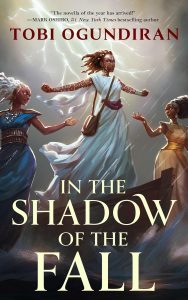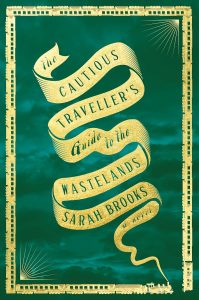The Year in Review 2024 by Archita Mittra

(2024)
2024 was bit of an irregular year for me, reading-wise. As per my notebooks, I read around 90 books (alas, less than my last year’s score of 110 on Goodreads) – the main course obviously being speculative fiction, with a small dessert sampling of literary fiction, romances, comics and non-fiction. The meal wasn’t entirely satisfying, as there were plenty of anticipated titles that I didn’t get to read, and plenty that I did which weren’t as exciting or as memorable as I’d hoped. That being said, the year did throw in a few surprises, so it’s easy to pick my favourites for each genre.
Jared Pechaček’s debut weird fantasy novel, The West Passage, is an absolute stunner, unabashedly embracing the inventive and whimsical possibilities of genre. It has the pure, liquid quality of watching a medieval manuscript come alive – as though the strange characters curled along the illuminated margins suddenly decided to embark on a grand adventure. The multilayered narrative unfolds inside an ever-changing Gormenghast-esque castle – a bewildering wonderland of sorts, filled with giant Ladies, an ancient beast, beekeepers, lantern-people and other curious creatures from a dark fantasy bestiary. The worldbuilding feels unique and refreshing, with Pechaček carefully drawing upon folklore and fairytale elements to craft a wryly humorous and surreal-tinged book that deftly builds upon the baroque architecture of the New Weird. It’s an Alice in Wonderland adventure for adults, but it’s also so much more, a Boschian tapestry delighting in sheer wonder and decadence.
In the realm of sci-fi, I simply adored Samantha Harvey’s Booker-winning Orbital. I’m not going into whether this slim volume counts as a novella or a novel, and if it belongs in the field of literary fiction or genre, or both. The book follows the lives of six astronauts aboard the International Space Station, and Harvey paints a vivid portrait of their daily routines as well as the mesmerizing views of Earth from space with lyrical eloquence and empathy, creating a magical and immersive experience for the reader. The prose is exquisite and introspective, capturing the vast and lonely beauty of space and of our miraculous and fragile coexistence on the only habitable planet in the universe (that we know of, so far). Finishing Orbital was like waking up from a deep dream, trying to hold onto half-formed images, memories and feelings, even as they slipped away – and yet knowing that unlike a dream, I can still revisit the sublime beauty of this book with every reread. So, for me, Orbital definitely counts as science fiction – the science in it is meticulously well-researched, confidently invoking what it means to be an astronaut for readers who (in all likelihood) will never venture into space nor catch a glimpse of Earth from afar. But I suppose that’s precisely what art is for – an exercise in translating the untranslatable.
Strangely enough, 2024 was also the year I veered more towards horror. The top contender for my favorite-book-of-the-year-award would probably be Layla Martinez’s debut horror novel (or novella?) Woodworm – an eerie little book that grapples with female rage, generational trauma, and ghosts. Of course, haunted house stories are a staple of the horror genre, but Woodworm takes it a step further, poking at the rotting floorboards, the cracks in the walls, and the underlying shadows, until the very structure is ready to come apart, and bare the horrors to the outside world. At its cankerous core, it is the story of two women – grandmother and granddaughter – trapped by circumstances beyond their control in a little Spanish village, marked by the travails of patriarchy and class inequality. At times, it is hard to tell their perspectives apart, and that’s precisely the grim point Martinez is trying to make. It’s a revenge narrative investigating the limited situational agency of women, where revenge isn’t an achievement but a matter-of-fact necessity in a world bereft of justice, an inevitable and unexorcisable apparition born of anger, frustration, and sorrow, haunting and harming all relevant parties long after the deed is done. The characters never quite achieve catharsis or closure, reflecting the lived realities of marginalized peoples trying to eke out an existence under deeply unjust systems of power. If you’re in the mood for a visceral, gut-wrenching and painfully poignant read, Woodworm (translated into English by Sophie Hughes and Annie McDermott) might just be the book for you.
I also think that the constant exposure to the various systemic injustices in the world (both in my country and beyond, but especially the ongoing genocides livestreamed into our phones daily) and the ever-looming threat of climate change is partly the reason why the horror genre suddenly feels so comfortable and familiar to me. In that regard, Mariana Enriquez, with her unnerving horror short story collections, steeped in Argentinean politics, has quickly become an auto-buy author. Her latest collection, A Sunny Place for Shady People (translated by Megan McDowell), offers an assortment of nightmares, straddling socio-political issues with a deliberately Gothic flavor (in the vein of Angela Carter and Carmen Maria Machado), and is perhaps her strongest work in the short fiction form, yet (I’m yet to read her critically lauded novel, Our Share of Night). Most of her tales grapple with the horrors of inhabiting female-coded bodies under systems designed to be as exploitative and extractive at possible, and yet there is still room for compassion, for hope, for solidarity and seizing control in limited ways that nevertheless make a difference.
 Two other speculative fiction collections (both coincidentally by Indian authors) that I found particularly memorable were Puloma Ghosh’s Mouth and Gigi Ganguly’s Biopeculiar: Stories of an Uncertain World. Brilliantly atmospheric and resonant, Mouth excavates latent and complex feelings of desire, guilt, pain and grief, and articulates them with a haunting and profound sense of clarity. From dating mishaps to vignettes about university life, from performing autopsies to befriending a vampire in a skate park, there’s a spectral thread of longing and isolation in all the stories that feels all too relatable. It’s not very often that I stumble upon a collection where every story is a gem – but Mouth, with its 11 expertly-crafted tales is one of them, with a distinctive sad-girl horror sensibility. On the other hand, Biopeculiar by Gigi Ganguly is more whimsical and lighthearted, utilizing the speculative form to explore nonhuman perspectives with élan. From detective birds to kidnapped clouds, Ganguly’s fabulist tales are populated with memorable (and mostly) animal characters that amuse and teach, reminding the reader of the wonders of the natural world that we often take for granted.
Two other speculative fiction collections (both coincidentally by Indian authors) that I found particularly memorable were Puloma Ghosh’s Mouth and Gigi Ganguly’s Biopeculiar: Stories of an Uncertain World. Brilliantly atmospheric and resonant, Mouth excavates latent and complex feelings of desire, guilt, pain and grief, and articulates them with a haunting and profound sense of clarity. From dating mishaps to vignettes about university life, from performing autopsies to befriending a vampire in a skate park, there’s a spectral thread of longing and isolation in all the stories that feels all too relatable. It’s not very often that I stumble upon a collection where every story is a gem – but Mouth, with its 11 expertly-crafted tales is one of them, with a distinctive sad-girl horror sensibility. On the other hand, Biopeculiar by Gigi Ganguly is more whimsical and lighthearted, utilizing the speculative form to explore nonhuman perspectives with élan. From detective birds to kidnapped clouds, Ganguly’s fabulist tales are populated with memorable (and mostly) animal characters that amuse and teach, reminding the reader of the wonders of the natural world that we often take for granted.
On the novel front as well, it’s been a good year for Indian speculative fiction. Prashanth Srivatsa’s The Spice Gate is a richly rewarding epic fantasy novel where spices function as portals to different far-flung kingdoms rife with inequality and discrimination. Packed with twists and turns, it’s a sweeping tale of survival and the age-old quest for freedom. Amal Singh’s The Garden of Delights is similarly gorgeous and sweet, steeped in floral metaphors and magic. Singh’s prose has a dreamy, melancholic quality to it, transporting readers to a faraway magical world, filled with inventive details. Finally, following the success of her dystopian mosaic novel The Ten Percent Thief Lavanya Lakshminarayan returns with another delicious sci-fi page-turner, Interstellar MegaChef, that explores food history and culinary traditions in mouthwatering prose with an unexpected (yet utterly wholesome) enemies-to-friends-to-lovers romance thrown into the mix. Lakshminarayan manages to write morally grey characters who learn from their mistakes while also detailing the repercussions of a futuristic technology that can permanently alter one’s relationship with food and cultural identity. Thus, each of the three novels are quite fun, exuberant, and thoughtful in their own ways, and strongly recommended.
 Among the novellas that I quite enjoyed this year, the two that stood out the most are Tobi Ogundiran’s In the Shadow of the Fall and Premee Mohamed’s The Butcher of the Forest. Infused with Yoruba mythology, In the Shadow of the Fall is the fast-paced first half of Ogundiran’s The Guardian of the Gods duology, which follows a failed acolyte who soon gets embroiled in a cosmic war between selfish gods and callous godkillers. While it’s a fairly straightforward subversion of the ‘‘Chosen One’’ trope, the narrative is quite engaging – and there’s a sequel coming out next year that I had the good fortune of reading early and can therefore confirm to be equally entertaining. Meanwhile, The Butcher of the Forest by the extremely prolific Premee Mohamed appealed to my innate preference for fairytale retellings and stories featuring the fae. Tightly plotted and densely evocative, the novella centers on Veris, an embittered woman who is sent into the deep, dark forest by a tyrant to rescue his fey-abducted children. Like Emily Carroll’s graphic novel Through the Woods, The Butcher of the Forest also unfolds like a familiar Grimm’s fairytale, resplendent in all its nasty glory, eschewing the happily-ever-after for a more Gothic (and realistic) conclusion.
Among the novellas that I quite enjoyed this year, the two that stood out the most are Tobi Ogundiran’s In the Shadow of the Fall and Premee Mohamed’s The Butcher of the Forest. Infused with Yoruba mythology, In the Shadow of the Fall is the fast-paced first half of Ogundiran’s The Guardian of the Gods duology, which follows a failed acolyte who soon gets embroiled in a cosmic war between selfish gods and callous godkillers. While it’s a fairly straightforward subversion of the ‘‘Chosen One’’ trope, the narrative is quite engaging – and there’s a sequel coming out next year that I had the good fortune of reading early and can therefore confirm to be equally entertaining. Meanwhile, The Butcher of the Forest by the extremely prolific Premee Mohamed appealed to my innate preference for fairytale retellings and stories featuring the fae. Tightly plotted and densely evocative, the novella centers on Veris, an embittered woman who is sent into the deep, dark forest by a tyrant to rescue his fey-abducted children. Like Emily Carroll’s graphic novel Through the Woods, The Butcher of the Forest also unfolds like a familiar Grimm’s fairytale, resplendent in all its nasty glory, eschewing the happily-ever-after for a more Gothic (and realistic) conclusion.
 Before I sign off, there are a few more books I’d like to highlight. Sarah Brooks’s The Cautious Traveller’s Guide to the Wastelands is a phantasmagorical ride that invites the reader to board the Great Trans-Siberian Express alongside the secretive characters, and travel through the uncharted wilderness populated by mysterious creatures that seem to elude human understanding. Then, there’s Such Lovely Skin, the YA techno-horror debut by Tatiana Schlote-Bonne which was pretty much unputdownable. It follows Vivian, a Twitch streamer and indie gamer haunted by the memory of her little sister’s death and an evil doppelganger that sets out to ruin her life. It’s a funny and breezily written novel about a Faustian bargain gone wrong, with nods to horror movies like The Ring and plenty of light scares. Sierra Greer’s Annie Bot is a journey of self-discovery from the point of view of a sexbot struggling to break free from her male owner’s coercive control. While it doesn’t quite do anything new with the subject matter, it’s easily an allegory for abusive relationships, interrogating vital questions of agency, autonomy, intimacy, and consent that are especially relevant in the wake of proliferating AI systems that replicate and amplify misogynistic biases, besides doing other harm to humanity and the planet. Finally, I was pleasantly surprised to learn that Cornelia Funke, one of my favorite childhood authors, has returned to the metafictional world of Inkheart with The Color of Revenge, the fourth volume in the series. Dustfinger, one of the series’ much-loved characters, makes an appearance, as does a familiar villain, Orpheus, and while it doesn’t quite channel the quaint magic of the original Inkworld trilogy, it made me rather nostalgic and wistful not just for all the fantasy books that I adored as a kid, but also for the genre itself. Metafantasy children’s books, such as the Inkheart or even older works in that tradition, such as Michael Ende’s The Neverending Story, situate the child fantasy reader in a special light, blurring the boundaries between character and reader, until the promise of magic becomes tantamount to itself, and the escapism complete.
Before I sign off, there are a few more books I’d like to highlight. Sarah Brooks’s The Cautious Traveller’s Guide to the Wastelands is a phantasmagorical ride that invites the reader to board the Great Trans-Siberian Express alongside the secretive characters, and travel through the uncharted wilderness populated by mysterious creatures that seem to elude human understanding. Then, there’s Such Lovely Skin, the YA techno-horror debut by Tatiana Schlote-Bonne which was pretty much unputdownable. It follows Vivian, a Twitch streamer and indie gamer haunted by the memory of her little sister’s death and an evil doppelganger that sets out to ruin her life. It’s a funny and breezily written novel about a Faustian bargain gone wrong, with nods to horror movies like The Ring and plenty of light scares. Sierra Greer’s Annie Bot is a journey of self-discovery from the point of view of a sexbot struggling to break free from her male owner’s coercive control. While it doesn’t quite do anything new with the subject matter, it’s easily an allegory for abusive relationships, interrogating vital questions of agency, autonomy, intimacy, and consent that are especially relevant in the wake of proliferating AI systems that replicate and amplify misogynistic biases, besides doing other harm to humanity and the planet. Finally, I was pleasantly surprised to learn that Cornelia Funke, one of my favorite childhood authors, has returned to the metafictional world of Inkheart with The Color of Revenge, the fourth volume in the series. Dustfinger, one of the series’ much-loved characters, makes an appearance, as does a familiar villain, Orpheus, and while it doesn’t quite channel the quaint magic of the original Inkworld trilogy, it made me rather nostalgic and wistful not just for all the fantasy books that I adored as a kid, but also for the genre itself. Metafantasy children’s books, such as the Inkheart or even older works in that tradition, such as Michael Ende’s The Neverending Story, situate the child fantasy reader in a special light, blurring the boundaries between character and reader, until the promise of magic becomes tantamount to itself, and the escapism complete.
Overall, though, my reading journey this year left me a tad wanting. Perhaps I was craving just a little more magic and wonder from fictional realms to compensate for the lack thereof in the real world. Also, as a writer and a reviewer, it’s hard to make peace with the fact that you will never be able to read all the books that catch your attention – and that nine lifetimes probably won’t be enough to read them all. There were plenty of titles I read this year that were pretty mediocre, but taught me a lot about my own evolving tastes and preferences, as well as adjusted my expectations from the publishing industry. And since there’s still a few more days until we welcome the new year, I’m, of course, hoping to squeeze in a couple more books from my near-infinite TBR list in a valiant, last-ditch effort to beat my Goodreads score from last year.
Here’s wishing everyone that 2025 is kinder and gentler to us all, with more bookish gifts galore!
Archita Mittra is a writer and artist, with a fondness for dark and fantastical things She completed her B.A (2018) and M.A (2020) in English Literature from Jadavpur University and a Diploma in Multimedia and Animation from St. Xavier’s College.
When she isn’t writing speculative fiction or drawing fanart, she can be found playing indie games, making jewelry out of recycled material, reading a dark fantasy novel, baking cakes, or deciding which new Tarot deck to buy.
She lives in Kolkata, India, with her family and rabbits.
This review and more like it in the February 2025 issue of Locus.
 While you are here, please take a moment to support Locus with a one-time or recurring donation. We rely on reader donations to keep the magazine and site going, and would like to keep the site paywall free, but WE NEED YOUR FINANCIAL SUPPORT to continue quality coverage of the science fiction and fantasy field.
While you are here, please take a moment to support Locus with a one-time or recurring donation. We rely on reader donations to keep the magazine and site going, and would like to keep the site paywall free, but WE NEED YOUR FINANCIAL SUPPORT to continue quality coverage of the science fiction and fantasy field.
©Locus Magazine. Copyrighted material may not be republished without permission of LSFF.








Fantastic reviews. What are some good Lit. Fiction recommendations? Thank you for your efforts.